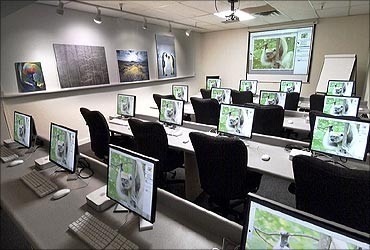Scientists have developed a computer that can be controlled by the power of thought, a breakthrough which they say could soon help people unable to speak or move.
In tests, reported in the Journal of Neural Engineering, volunteers were found to be able to move a cursor on a screen simply by 'saying' words in their heads.
The device, developed by researchers at the Washington University School of Medicine, is believed to have massive implications for patients who have lost the power of speech through brain injury or stroke.
It could also help disabled people control wheelchairs or robotic arms, and could even revolutionise the computer games industry, the researchers said.
. . .
Now a computer that your thoughts can control
"This is one of the earliest examples, to a very, very small extent, of what is called 'reading minds' -- detecting what people are saying to themselves in their internal dialogue," Dr Eric Leuthardt, who led the research, was quoted as saying by the Daily Mail.
To develop the gadget, Dr Leuthardt used a technique, called electrocortiography or ECoG, to connect the brains of volunteers suffering from epilepsy directly to a computer.
Electrodes were inserted through the skull until they came into contact with the brain where they could record electrical activity.
. . .
Now a computer that your thoughts can control
The technique has previously been used to identify regions of the brain that cause epilepsy and has led to effective treatments of the condition.
The study used four patients aged 36 to 48.
During the trials, the electrodes emitted signals which were picked up and recorded on a computer.
During the experiment, the volunteers sat in front of a computer screen and tried to move a cursor by either saying or thinking pre-defined words.
For instance, the word 'ah' moved the cursor right. Other words 'ee', 'oo' and 'eh' moved the cursor up, down and left.
The volunteers mastered controlled the computer quickly and without much training, the researchers said.
. . .
Now a computer that your thoughts can control
Photographs: Pawel Kopczynski/Reuters
In the future, researchers hope to permanently insert implants into a patient's brain to help them communicate -- or even to allow a computer to read their mind.
Dr Leuthardt said: "We want to see if we can not just detect when you're saying dog, tree, tool or some other word, but also learn what the pure idea of that looks like in your mind.
"It's exciting and a little scary to think of reading minds, but it has incredible potential for people who can't communicate or are suffering from other disabilities."
Over the last decade scientists have developed a host of gadgets that can be controlled with the power of the mind or a 'brain-computer interface'.
The technology has also been used to control wheelchairs, television remote controls and speech synthesisers.
Now a computer that your thoughts can control




article